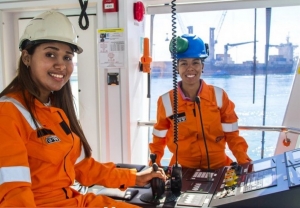


(Posted on 17/05/21)
How can shipping companies support women seafarers’ mental wellbeing and eradicate gender discrimination and are they doing enough? These were some of the topics that Sophia Onken, Partner and Clinical Psychologist at Mental Health Support Solutions (MHSS), discussed during the ‘Wellbeing For Women In Shipping’ webinar on 14 May.
The event organised by MHSS – which provides professional mental health support and guidance across the maritime sector – explored the challenges facing female crewmembers such as sexual harassment, bullying, gender discrimination and the stresses of life aboard a vessel. It also covered resilience strategies for women in shipping, how to improve their wellbeing and the issues that need addressing to improve their working lives.
“When it comes to seafaring, it seems women are often treated as the underdogs,” said Ms Onken. “Typical reasons for this include being perceived as inferior to men, receiving unequal treatment to their male counterparts and suffering from verbal or physical sexual harassment.”
Ms Onken added that the lack of women in the maritime industry – accounting for just 2% of the workforce – was a major barrier for females at sea. “There is a low ratio of females to males on deck, which could partly explain why their issues aren’t addressed at work,” she said. “For this reason, more female employment in shipping should be encouraged.”
While seafaring is a prime cause of stress-related suicide among men, studies show that mental health issues are also a concern for their female counterparts. “Some women experience work-related stress and physical concerns when aboard a ship, which can lead to suicide attempts,” said Christian Ayerst, CEO of MHSS.
Research in recent years highlights some of the issues that women seafarers face when at work. According to a survey on women seafarers’ health and welfare, 18% of the 595 women crewmembers who responded said they had been sexually harassed while on board.
“The study clearly shows the need to raise awareness because many women experience unfair treatment at work,” Ms Onken said. “One example is not having access to sanitary bins or female-specific products.”
The main symptoms for women with physical or mental health problems at sea were joint/back pain, stress/depression/anxiety and headaches, with 55% attributing these issues to their work.
A separate study on women working at sea for Greek-owned shipping companies found that men saw their female counterparts as equals when it came to career success. However, only a minority of men felt that women could perform as well as male crewmembers. The ‘Employment of women at sea’ report also revealed that most men were unwilling to accept a woman as their superior in the ship’s hierarchy or as port captains ashore.
AtoB@C Shipping, a subsidiary of ESL Shipping, has announced the successful delivery of Fleximar, the... Read more
Western Bulk, together with reputable Norwegian partners A/S J. Ludwig Mowinckels Rederi, Premium Maritime... Read more
Pacific Basin Shipping Limited, one of the world’s leading dry bulk shipping companies, has announced... Read more
Columbia Group anticipates a period of strong expansion as an increasing number of international shipowners... Read more
Norse?Ship Management has expanded its use of Smart Ship Hub’s high frequency sensor data and... Read more
As the maritime industry gears up to welcome the IMO’s STCW bullying and harassment training amendments... Read more
NORDEN has acquired the cargo activities of Taylor Maritime in Southern Africa (previously operated... Read more
Philippos Ioulianou, Managing Director of EmissionLink, has warned the IMO’s decision to delay... Read more
VIKAND has highlighted the need for cultural change in the maritime sector as reports of bullying, harassment... Read more
The maritime industry is experiencing a period of significant transformation, driven by rapidly evolving... Read more